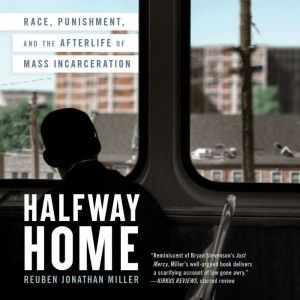Quotes
“In Halfway Home, Miller wants us to understand incarceration’s “afterlife”. The book is the culmination of Miller’s research in Chicago and Detroit… it’s also deeply informed by his own personal experiences with the carceral system...Hearts and minds, in this sense, have little to do with people’s feelings. Miller, with this powerful book, implores us to try.”—Jennifer Szalai, New York Times
“Miller writes about criminal justice with the expertise of a legal scholar, but his life experiences and training as a social worker endow his analysis with a vividness and empathy that elude some other critiques of mass incarceration. And he tells stories with a plaintive lyricism that reminded me that Black folks in Chicago were primary creators of the American musical tradition known as the blues.”—Paul Butler, Washington Post
“Impressive…Miller writes in prose that is at once powerful and engaging...This seminal work tracks the path of how we got here.”—NPR.org
“Through vivid stories and evidence of this afterlife…Miller describes “a new kind of prison”…in heartbreaking prose.”—National Book Review
"For incarcerated persons in the United States, release does not equal freedom. Miller’s first book is an important, harrowing ethnographic study that reads like a keenly observed memoir, which, in part, it is. His own father and brothers having been imprisoned, Miller, a chaplain at the Cook County Jail in Chicago, is candidly close to his research on mass incarceration and its after effects. This is essential reading for all who care about justice in contemporary America.”
—Library Journal, starred review
"Striking a unique balance between memoir and sociological treatise, this bracing account makes clear just how high the deck is stacked against the formerly incarcerated."—Publishers Weekly, starred review
“Reminiscent of Bryan Stevenson’s Just Mercy, Miller’s well-argued book delivers a scarifying account of law gone awry.”—Kirkus, starred review
“Halfway Home is a vital and compelling account of the entangled legacies of racism, crime, and punishment in America. Miller shows how the nation’s experiment with mass incarceration harms those far removed from the prison's bars. Family members with incarcerated brothers and husbands confront confusing regulations that place restrictions on their loved ones and face impossible choices between caring for family members locked-up or those at home. This persuasive and essential work weaves together moral philosophy, in-depth interviews, legal theory, and personal history, reckoning with the meaning of justice and redemption in an unjust society.” —Matthew Desmond, Pulitzer Prize-winning author of Evicted
“As this beautifully written, stunning, and deeply painful reckoning with our nation’s carceral system makes clear, we have not remotely yet grasped what drives it, nor how devastating is its reach. As Miller shows so powerfully, the damage done by this system has been so insidious, and so comprehensive, that certain Americans are always, in effect, doing time and, thus, to undo this crisis, and for most incarcerated Americans to truly ever be able to come “home,” will mean doing a whole lot more work than we have yet done.”—Heather Ann Thompson is the Pulitzer Prize winning author of Blood in the Water: The Attica Prison Uprising of 1971 and its Legacy
“In this subtle mix of memoir, meditation, and sociology, Reuben Miller takes us inside the lives of poor black men and their loved ones whose existences are mangled by the deadly combination of poverty, pain and prison. This vivid portrait of the penal state in action from the viewpoint of its targets will captivate scholars and energize activists for criminal justice reform.”—Loïc Wacquant, author of Punishing the Poor: The Neoliberal Government of Social Insecurity



